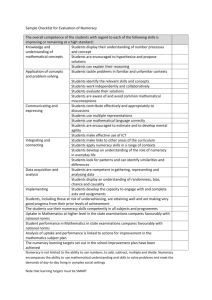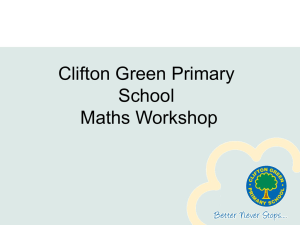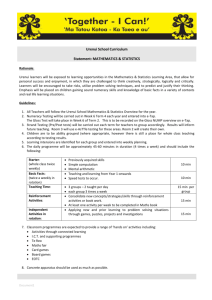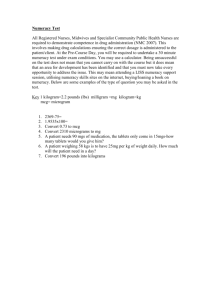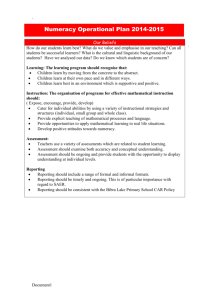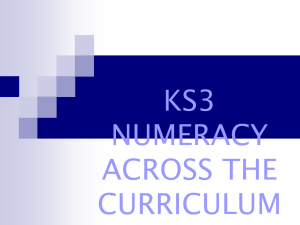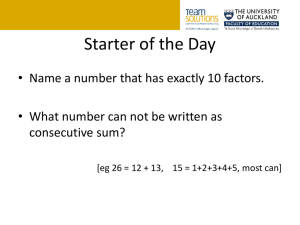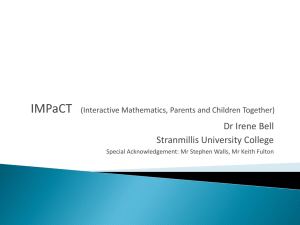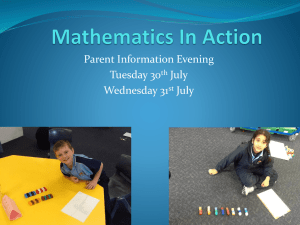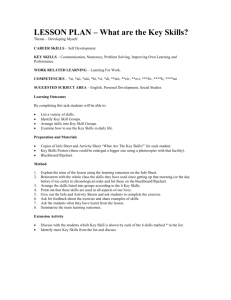Maths and Numeracy Policy July 2014
advertisement
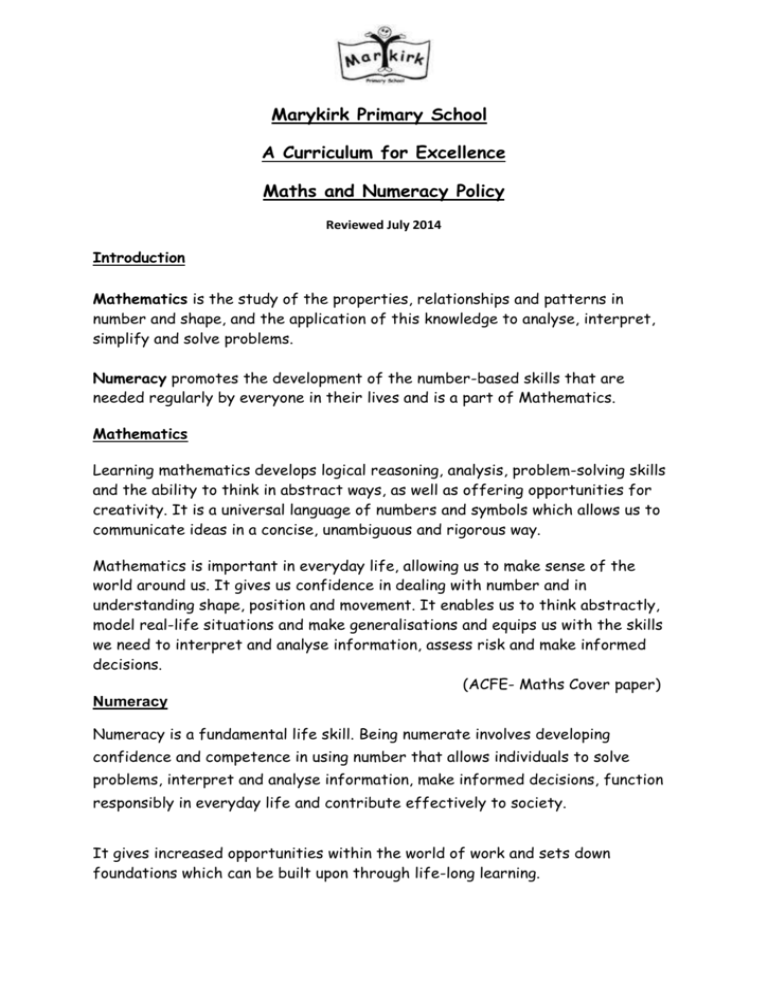
Marykirk Primary School A Curriculum for Excellence Maths and Numeracy Policy Reviewed July 2014 Introduction Mathematics is the study of the properties, relationships and patterns in number and shape, and the application of this knowledge to analyse, interpret, simplify and solve problems. Numeracy promotes the development of the number-based skills that are needed regularly by everyone in their lives and is a part of Mathematics. Mathematics Learning mathematics develops logical reasoning, analysis, problem-solving skills and the ability to think in abstract ways, as well as offering opportunities for creativity. It is a universal language of numbers and symbols which allows us to communicate ideas in a concise, unambiguous and rigorous way. Mathematics is important in everyday life, allowing us to make sense of the world around us. It gives us confidence in dealing with number and in understanding shape, position and movement. It enables us to think abstractly, model real-life situations and make generalisations and equips us with the skills we need to interpret and analyse information, assess risk and make informed decisions. (ACFE- Maths Cover paper) Numeracy Numeracy is a fundamental life skill. Being numerate involves developing confidence and competence in using number that allows individuals to solve problems, interpret and analyse information, make informed decisions, function responsibly in everyday life and contribute effectively to society. It gives increased opportunities within the world of work and sets down foundations which can be built upon through life-long learning. Whilst numeracy is part of mathematics, it is also a core skill which permeates all areas of learning, allowing pupils the opportunity to access the wider curriculum. (ACfE- Numeracy Outcomes paper) Rationale ‘All teachers have responsibility for promoting the development of numeracy. With an increased emphasis upon numeracy for all young people, teachers will need to plan to revisit and consolidate numeracy skills throughout schooling.’ Building the Curriculum 1 ‘To face the challenges of the 21st Century, each young person needs to have confidence in using mathematical skills, and Scotland needs both specialist mathematicians and a highly numerate population.’ Building the Curriculum 1 It is therefore important that all teachers look for opportunities to develop and reinforce numeracy and mathematics skills within their own teaching activities and through cross curricular projects and studies. Aims At Marykirk Primary School we aim: 1. To develop a positive attitude to numeracy and maths as an interesting and exciting subject in which all children gain success and enjoyment 2. To develop mathematical understanding through systematic direct teaching of appropriate learning objectives 3. To encourage the effective use of numeracy and maths as a tool in a wide range of activities within and outwith school and, subsequently, adult life 4. To develop an ability in the children to express themselves fluently, to talk about the subject with confidence, using correct mathematical language and vocabulary 5. To develop an appreciation of relationships within maths and numeracy 6. To develop the ability to think clearly and logically with independence of thought and flexibility of mind 7. To develop mathematical skills and knowledge and quick recall of basic facts Learning and Teaching Approaches At Marykirk Primary School, Numeracy and Maths are currently planned for using the CfE. Active involvement in mathematical experiences, set in real and relevant contexts, is vital to the development of knowledge, understanding, skills and a positive attitude towards numeracy and mathematics. Within a rich and supportive learning environment, best practice will draw upon a skilful mix of approaches, including: Planned active learning with opportunities to observe, explore, investigate, experiment and play Development of problem-solving capabilities Development of mathematical thinking skills Development of skills and accuracy in mental agility Use of relevant contexts, familiar to young people’s experiences Appropriate, effective use of technology Building on the principles of Assessment is for Learning Collaborative and independent learning Making links across the curriculum where appropriate Increased opportunities for discussion, communication and explanation of thinking From the early stages onwards, we aim for all our pupils to experience success in mathematics and develop the confidence to take risks, ask questions and explore alternative solutions without fear of being wrong. They should, therefore, enjoy exploring and applying mathematical concepts to understand and solve problems, explaining their thinking and presenting their solutions to others in a variety of ways. At all stages, the use of collaborative learning encourages children to reason logically and creatively through discussion of mathematical ideas and concepts. Misconceptions and wrong answers are to be used as opportunities to improve and deepen children’s understanding of mathematical concepts, through use of effective questioning and discussion. Teachers work to ensure that the fundamental numeracy skills are established and consolidated through imaginative and interactive approaches, to enable children to develop a sound understanding of number. Emphasis is still to be placed on establishing the foundations of numeracy, such as confidence in recall and use of number bonds and multiplication facts, understanding of place-value, and the application of mental strategies. These skills will be continually reinforced throughout the pupils’ education. Oral/Mental Maths activities are used on a daily basis. Individual, group or class teaching, using direct or indirect methods, are used as appropriate to the circumstances of the class/ stage. Practical experience and use of number and maths equipment is vital to facilitate learning and promote better understanding. Wherever possible, ICT is used to enhance learning- eg: use of Smartboard, Education City and other interactive games. Planning In Marykirk Primary School, the Maths and Numeracy curriculum is delivered principally through the CfE experiences and outcomes. The following schemes of work are available to support the learning, as appropriate to the needs of the pupils in the class: Scottish Heinemann Maths TEEJAY Teachers use the school planners to plan and record progression. Assessment and Monitoring In mathematics, as in other curricular areas, assessment forms an integral and ongoing part of learning and teaching. It is gathering of evidence of attainment and progression for the purpose of informing future planning, teaching and reporting. In working with pupils, our teachers continuously evaluate and make use of this assessment in planning future activities. Assessment for Learning strategies are used on a daily basis. Formative and summative assessment will be used in the learning & teaching process: To share learning objectives and success criteria clearly To assess understanding through skilful questioning To give pupils clear and regular feedback To assist learners and teachers to identify the next steps in the learning process which will ensure progression To engage in the process of self and peer assessment On-going classwork will be the main source of evidence, available through observation of: 1. Oral questioning and discussion 2. Practical tasks 3. Pupils’ written work 4. Pupil’s own assessments and comments More formal evidence will be gathered at key development stages. This will include mental, written and task – based activities, linked to the experiences and outcomes of CfE. Transitions (Pre-school/Primary/Secondary) Through liaison within Marykirk Primary School and with our associated preschool establishments, evidence of prior learning will be the starting point for pupil learning. Information regarding pupil attainment in mathematics at P7 will be passed on to Mearns Academy through existing and developing primary/secondary liaison arrangements. Partnership Partnership working will underpin the mathematics policy in practice: Teaching and support staff collaboration to enhance learning experiences with practical activities Partnership working between children will be encouraged when appropriate Collaboration between ASN Teacher and Class Teacher to plan IEPs for children as needs arise Teacher and support staff collaboration to ensure resources and displays are well organised and maintained Partnership with parents will be encouraged through the appropriate use of Homework Partnership with other schools in the Cluster through activities such as Number/Problem Solving days. References A Curriculum for Excellence - Building the Curriculum 1 A curriculum for Excellence – Building the Curriculum 3 A Curriculum for Excellence -Cover paper for draft experiences and outcomes in Mathematics A Curriculum for Excellence - Cover paper for draft experiences and outcomes in Numeracy
